I have a class named NIFERepository. It contains a SaveObject method, which returns nothing and performs an operation on a database.
public class NIFERepository<E>
{
protected void SaveObject(object saveObject)
{
if (saveObject is E)
this.RepositorySession.Merge(saveObject);
}
}
1 . I wish to create a public extension method who calls this SaveObject() method, like this:
public static class NIFERepositoryExtensions
{
public static T Save<T, E>(this T self, E saveObject) where T : NIFERepository<E>
{
self.SaveObject(saveObject);
return self;
}
}
But the protected scope doesn't allow my extensions method to recognize it.
Is there a way for me to get a method of this form to work?
2 . I created my extension method with 2 types: T and E. T is the instance who called it, and E is the defined type into my ProductRepository<Product>, for example. When I call this method, the defined type is not shown.

Is there a way for me to get this to work?